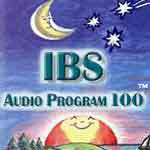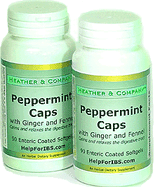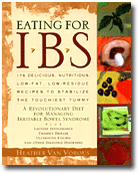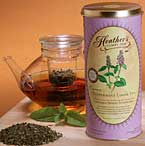| |
 |

Organic Acacia
Soluble Fiber
The prebiotic fiber that reduces bloating & gas!

In this Issue...
Food & Recipes
Rx News & Research
Ask Heather
About Us

Gut-directed hypnosis is one of the most effective ways to help relieve all IBS symptoms! Results can last more than 5 years.


Fennel Tummy Tea for
IBS Bloating & Gas
Fennel has anti-spasmodic properties and it stimulates the production of gastric juices. Fennel tea is the best for relieving bloating and gas!
Did you miss the latest
IBS newsletter and
Lime Mint Sorbet?
Past issues
are posted here!

Try Peppermint Caps
Peppermint Caps are the best for abdominal spasms, cramps and pain!

Delicious Recipes
for IBS!
Learn how to eat well and feel better

The IBS Starter Kit!
Learn every way possible to successfully manage your symptoms!
With the First Year: IBS, an essential guide, plus Eating for IBS, plus Acacia Tummy Fiber to start stabilizing immediately!

Try Heather's
Peppermint Tummy Tea
Peppermint is a smooth muscle relaxant and has pain-killing properties. Our tea is large leaf with a high volatile oil content - much stronger than tea bags!
|
 |
|
| |

Did your email mangle this newsletter? Copy and paste this address into your browser window:
http://www.helpforibs.com/news/newsletter/vietnoodle081004.html or click here to see it online.
August 10, 2004
This week ~ Inflammatory Bowel Disease or IBS?
Hello to everyone -
We're welcoming August with a light dinner salad of rice noodles, shrimp, fresh herbs, and mango. This one-dish cold meal is perfect for hot summer days, and its sparkling flavors come straight from Vietnam. The lime dressing is tart and tangy, the shrimp and mango are mellow and sweet, and the colors are absolutely gorgeous. Rice noodles are such a great soluble fiber staple for so many recipes, but this is truly one of the best. As always, we also have a wealth of new digestive health research findings, plus we'll make sure there's no confusion between your diagnosis of IBS or IBD. Enjoy!
Best Wishes,
Heather Van Vorous
Note: Did a friend send you this newsletter? Sign up here for your own free subscription.

Vietnamese Rice Noodle Salad with Shrimp & Mango
Makes 3-4 Servings
Dressing:
2 tablespoons Thai or Vietnamese fish sauce*
1 tablespoon white vinegar
1 tablespoon granulated sugar
2 tablespoons fresh lime juice
1 large garlic clove, minced
Combine all dressing ingredients in a small bowl and set aside.
1/2 lb. shrimp, shelled and deveined
1/2 lb. flat, 1/4" dry rice noodles*
1/2 cup peeled, diced, seeded cucumber
1/2 cup thinly sliced sweet white onion, such as Maui or Walla Walla
3 tablespoons packed fresh cilantro leaves, stems removed, finely chopped
3 tablespoons packed fresh mint leaves, stems removed, finely chopped
1/2 small ripe mango, peeled and diced
In a large saucepan of boiling water cook shrimp until just pink and cooked through, about 2 minutes. Drain. Halve shrimp horizontally and roughly chop.
In a bowl, soak the rice noodles covered in hot water for 15 minutes to soften them. While noodles soak, bring a large saucepan of water to boil. Add drained noodles and cook in boiling water just until tender, about 1 minute. Drain noodles and rinse with cold water until cool.
Combine noodles, shrimp, dressing, and all remaining ingredients in a large bowl. Toss until thoroughly mixed, then divide among 3 serving bowls.
*Available in the ethnic aisle of grocery stores, or at Asian markets.
For oodles of other delicious recipes, come visit the IBS Recipe Exchange board!
Are you just learning how to eat for IBS? A little intimidated at the thought of special IBS recipes? Not quite sure just what makes these recipes special in the first place? Don't worry! Come see
the IBS Diet pages, and find the answers to all your questions.
 Irritable Bowel Can Follow Dysentery
Irritable Bowel Can Follow Dysentery
In some cases, irritable bowel syndrome can result from a bout of dysentery caused by acute intestinal infection with Shigella bacteria, according to a report from China. Irritable bowel syndrome, or IBS, is an often-mysterious ailment, with no obvious explanation for sufferers' bloating, pain, diarrhea and constipation. Previous studies have suggested that a history of dysentery triples the risk of IBS, the researchers explain in the medical journal Gut. Despite this clue, it's not known how often IBS or the similar condition known as functional bowel disorder (FBD) occurs after Shigella-related dysentery.
Check here for more
information...
Cognitive-Behavioral Therapy, Hypnosis Can Help Soothe IBS
The causes of IBS are poorly understood in spite of much research, and medical treatments have proven relatively ineffective for that reason. Our research team found in a study of more than 1,600 patients that only 51 percent of them were at least somewhat better six months after seeing a doctor for IBS.
Until recently, there were no medications available specifically for IBS, but doctors used more general medications to treat individual symptoms of the disorder. In the past few years, two prescription medications for IBS have been in use -- one for IBS where constipation is predominant and another for patients who have mostly diarrhea. However, these medications only help at best about half of patients. The limited success of standard medical treatment has led researchers to seek different treatment alternatives for IBS. So far, the most promising of these have been psychological treatments.
Although it may at first seem far-fetched to treat bowel problems by talking to people, there are, in fact, a couple of good reasons for using psychological treatments for IBS. One is that studies have indicated that stress and other psychological symptoms substantially affect the bowel symptoms of many IBS sufferers. The other reason is that there is increasing evidence that a "dysfunction" in the brain's normal regulation of the sensations and activity of the bowels plays a role in causing IBS, and this problem might be correctible with psychological methods.
Many types of psychological treatment have been tested for IBS. The two that have been most consistently successful are cognitive-behavioral therapy and hypnosis. The majority of studies on both of these therapies have shown that they substantially improve all the central symptoms of IBS in up to 70-80 percent of treated patients and that the benefit often lasts for years after treatment.
Check here for more
information...
Curious about trying self-hypnosis for IBS? Learn all about how and why it works, then come ask any questions on our IBS Hypnotherapy Board.
Prevalence of IBS Differs by Diagnostic Criteria
Study Background: Prevalence of irritable bowel syndrome shows great variation among epidemiological studies, which may be due to different diagnostic criteria. Aim: To assess prevalence of irritable bowel syndrome according to various diagnostic criteria and to study differences in symptom severity, psychopathology, and use of health care resources between subjects fulfilling different diagnostic criteria. Conclusions: Prevalence of irritable bowel syndrome by Rome II criteria is considerably lower than by Manning criteria. Subjects fulfilling Rome criteria form a subgroup of Manning-positive subjects with more severe abdominal symptoms, more psychopathology, and more frequent use of the health care system.
Check here for more
information...
Parasite Therapy for Crohn's and Colitis?
Is it possible that an intestinal parasite holds a key to the treatment and possible cure for Crohn's disease, ulcerative colitis and other inflammatory bowel diseases (IBD)? Research at the University of Iowa suggests that infection by specific intestinal parasites may reduce the pain and inflammation associated with these serious diseases.
Crohn's disease and ulcerative colitis are part of a group of chronic inflammatory diseases of the gastrointestinal tract. The cause is unknown. IBD is becoming more common and our success at ridding our bodies of parasites may be to blame. With sanitation, better food and medications, intestinal parasites are relatively rare in industrialized societies, and that is a good thing. However, by making our lives increasingly hygienic, we may have made ourselves more susceptible to auto-immune diseases like Crohn's and ulcerative colitis.
Research involving intestinal parasites by Dr. Robert Summers of the University of Iowa, supported by the National Institutes of Health, may provide clues for a more natural (and effective) treatment of IBD. In his study, 29 patients with active Crohn's disease ingested the pig whip worm, Trichuris suis. This parasite cannot multiply in the human intestine and is not transmissible from human to human. These patients consumed the parasite every three weeks for 24 weeks. At 12 weeks, the symptoms of Crohn's disease decreased by 75 percent - and for 62 percent of the patients, the disease went into remission. At 24 weeks, the remission rate was an incredible 72.4 percent. There were no complications or adverse reactions.
In another study at the University of Iowa, patients with ulcerative colitis had a 48 percent improvement after 12 weeks, again without complications.
These response and remission rates with the pig whip worm are similar to those seen with medication, but apparently without the complications often associated with the drugs.
Check here for more
information...
Soy Protein Reduces Body Fat and Triglycerides in Women
A Japanese study finds that soybean beta-conglycinin may help to maintain a healthy body fat ratio and serum lipid levels in healthy women.
Beta-conglycinin, a major soy storage protein, has previously been found to reduce triglyceride levels in obese mice and inhibit atherosclerosis in mice. In the new study, researchers measured changes in body fat ratio and serum lipids after the ingestion of beta-conglycinin by 41 healthy women. The trend of change in body fat ratio following ingestion of the beta-conglycinin differed between students with a baseline body fat ratio over 25 per cent and those less than this amount.
In the former group the beta-conglycinin suppressed the increase in body fat ratio and in the six subjects who had a high total cholesterol level (e 5.72 mmol/L) there was a tendency towards reduced levels of serum triglyceride, free fatty acid, total cholesterol and lipoprotein although those levels did not change significantly.
The researchers concluded that if soybean beta-conglycinin is ingested continuously (5g daily), it will be effective in keeping body fat ratio and serum lipid levels normal and eliminating excessive lipids from the body.
Check here for more
information...
Looking to increase your soy intake? Check here for
hundreds of IBS-friendly recipes!
Looking for the latest IBS research and news?
Check out the IBS Research Library!
 IBS or IBD?
IBS or IBD?
"I'm so confused. One doctor told me I have IBS, another doctor told me I have colitis, and a third doctor thinks I might have Crohn's. Are these just different names for the same problem?"
No - there is a world of difference between Irritable Bowel Syndrome (sometimes mistakenly called spastic colitis) and Inflammatory Bowel Diseases (such as Crohn's, Ulcerative Colitis, or Microscopic Colitis). It's absolutely critical that you find a gastroenterologist you can trust, and that you continue to have diagnostic tests until you're given a firm, 100% certain diagnosis. Though some of the symptoms of IBS and IBD are similar (such as lower abdominal pain and bowel dysfunction) the underlying causes of the disorders and the medical attention they require are vastly different.
There's actually a great deal to learn about what IBS and IBD are, how they are diagnosed, what is going wrong with your body if you have these disorders, and what you can do to manage them. Although you'll need a doctor to make the actual diagnosis, you also need to rely on yourself here, and inform yourself as thoroughly as possible so that you know what questions to ask, and what procedure need to be done, in order to get a diagnosis you are confident is accurate. Sometimes it's a lot more difficult than you'd expect to rule out IBD and be left with a diagnosis of IBS. It's also possible to have both IBS and IBD, and if this is the case with you, you'll end up with separate (but also some overlapping) avenues of treatment.
If you haven't yet been properly diagnosed and you're dealing with the prospect of IBD, the first step is to learn all about inflammatory bowel diseases. What are they? What's the difference between Crohn's and Colitis? What are the symptoms? How should I be tested? The best place to start is at the IBD page in the IBS Glossary. If you come to learn that you do in fact have Crohn's or Colitis, it's even more important to inform yourself about the illness - you will need to be your own best expert here, even though you'll also need a good GI doctor you can trust and rely on. If you have a firm diagnosis and need to start learning as much about the details of IBD as possible, start reading through the chapters of the First Year: Crohn's & Colitis to get a grip on what lies ahead for you.
If you're faced with the possibility of an IBS diagnosis, it's equally important that you take ownership of this illness and learn all you can. IBS research has made tremendous leaps and bounds over the past several years, and much more is now known about the disorder. Not all of this information has reached GI and family physicians in practice, however. So, you may well find that as you educate yourself on IBS you end up better-informed about the brain-gut dysfunction, the Rome Criteria for diagnosis, and symptom management strategies than your own doctor. As long as you've worked with your doctor to reach an IBS diagnosis you have confidence in, this is okay. Treating IBS successfully (unlike IBD) can be left completely up to you, the patient.
If you're ready to start learning about an IBS diagnosis (what is it? what are the symptoms? what tests do I need? what the heck are the Rome Criteria and brain-gut dysfunction?) begin with the IBS page in the Irritable Bowel Syndrome Glossary. Once you have a firm diagnosis of IBS, symptom management and the actual day-to-day living with the disorder are elements you can confidently take control over - and again, information and education are key. Read through the chapters of the First Year: IBS for a tremendous head start on what it takes to get a grip on IBS, and how to control the problem, instead of letting the problem control you.
Wishing you the best,
Heather
One of the most popular previous IBS Newsletter columns was the Seven Sneaky Deadly Sins of the IBS Diet. Wondering what they all are? Check here...
1. Coffee (yes, decaf counts)
2. Yogurt (it's the safest dairy product for IBS...isn't it?)
3. Alcohol (just one glass of wine is okay, right?)
4. Vitamin supplements (they're good for you, aren't they?)
5. No insoluble fiber foods (they're triggers, so you just don't eat them, right?)
6. Too low a dosage of soluble fiber supplements
7. Not drinking enough water (doesn't soda pop count?)
 Heather & Company for IBS, LLC is dedicated to serving people with Irritable Bowel Syndrome. Our mission is to provide education, support, and products that allow people with IBS to successfully manage their symptoms through lifestyle modifications.
Heather & Company for IBS, LLC is dedicated to serving people with Irritable Bowel Syndrome. Our mission is to provide education, support, and products that allow people with IBS to successfully manage their symptoms through lifestyle modifications.
We offer extensive information and tangible help for IBS, including the world's best-selling and best-reviewed books for the disorder. We provide the internet's top IBS web site resources; a twice-monthly IBS Newsletter; seminars and classes; dietary brochures for patient distribution by health care professionals; an IBS Research Library; and Heather Cooks!, a healthy cooking show on Seattle television. Much of our work is based on Heather's development of the first and only comprehensive IBS dietary guidelines and recipes, an achievement which has earned numerous awards and accolades as well as thousands of thank you letters from IBS sufferers.
Heather & Company also provides the only patient-expert moderated IBS Message Boards on the internet with forums for diet, recipes, hypnotherapy, yoga, plus Crohn's and Colitis. In addition, we support and coordinate the formation and continuation of local in-person IBS support groups across the USA, Canada, the UK, Australia, and New Zealand. We will soon have other IBS services and products available.
Our website receives over 2.5 million visits each year, and our newsletter is sent to over 24,000 people. We are regular exhibitors at the Digestive Disease Week and American Dietetic Association conferences.
Sponsorship opportunities are available for the message boards and this newsletter for companies and/or products that have been legitimately established as helpful for digestive disorders.
Please contact us for information.

You are receiving this email because you have expressed interest in IBS news and information.
To unsubscribe from Heather's IBS Newsletter, click here http://www.helpforibs.com/news/unsub.asp or send an email to heather@helpforibs.com.
If you are viewing this newsletter on a website and would like to subscribe for email delivery, please "Join the IBS Newsletter" here.
ANTI-SPAM PRIVACY POLICY
LEGAL DISCLAIMER - This email is not intended to replace the services of a physician, nor does it constitute a doctor-patient relationship. Any application of the recommendations in this email is at the reader's discretion. Heather Van Vorous and Heather & Company for IBS, LLC are not liable for any direct or indirect claim, loss or damage resulting from use of this email and/or any web site(s) linked to/from it. Readers should consult their own physicians concerning the recommendations in this email.
Heather & Company for IBS, LLC
409 10th Avenue East Suite 202
Seattle, WA 98102 USA
© 2004 Heather & Company for IBS, LLC. All rights reserved.
|
|
|
|